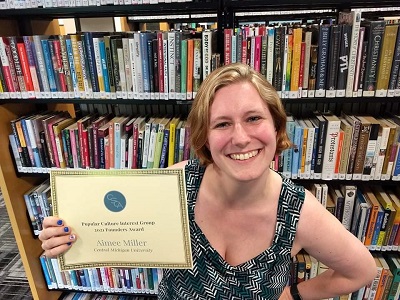Fandoms and Identity
 Aimee Miller, a graduate student in the Department of Communications, has received an award from the Central States Communication Association for her research on identity exploration within online fandom. A fandom is a community of fans that center around a specific book, character, fictional series, video game, etc. After analyzing the environment of Tumblr, a popular website known for housing fandoms and fanfiction, Miller was able to gain a better understanding of fandom and its ability to foster identity exploration.
Aimee Miller, a graduate student in the Department of Communications, has received an award from the Central States Communication Association for her research on identity exploration within online fandom. A fandom is a community of fans that center around a specific book, character, fictional series, video game, etc. After analyzing the environment of Tumblr, a popular website known for housing fandoms and fanfiction, Miller was able to gain a better understanding of fandom and its ability to foster identity exploration.
To begin her research, Miller performed a literature review in which she learned about performative identity, the idea that one tailors their identity based on their audience or context. Miller found this to be particularly true with fanfiction authors who remain primarily anonymous. Fanfictions are fictional stories that build upon preexisting worlds, characters or relationships within a specific fandom. Because of the anonymity, authors can freely explore unconventional ideologies without fear of judgment, and in return, explore aspects of themselves that mainstream spaces often ignore, such as queerness. Curious to learn more about how fanfiction authors perform their identity in regards to sexuality and queerness in online spaces, Miller took to Tumblr.
Launched in 2007, Tumblr is known for being a safe, inclusive and diverse space that encourages like-minded people to connect and explore their interests, no matter how unconventional. Tumblr allows its users to explore and celebrate their sexual identities safely and without suppression. To better understand this regarding fanfiction authors, Miller analyzed fourteen of the most popular Tumblr blogs, finding prominent queerness and gender expression themes.
One way sexual identity is performed and explored by fanfiction authors is through the reblog function on Tumblr. Though not their original works, these reblogs provide valuable insight into the users’ thoughts, feelings and interests. While some choose a more indirect route to perform their identity, “others tackled it head-on” and produce their own written or visual content that highlights their queerness. As a result, followers of that particular user may feel inspired to explore their sexuality, and thus a safe and inclusive space is created. The same feeling of safety and inclusion was also found for people regarding gender expression within fandom on Tumblr. In conclusion, Miller’s findings suggest that Tumblr provides an excellent space for fanfiction authors to freely explore and express their identities.
At CMU, we do research and real-world results.
Story by ORGS intern Hailey Nelson
September 2021